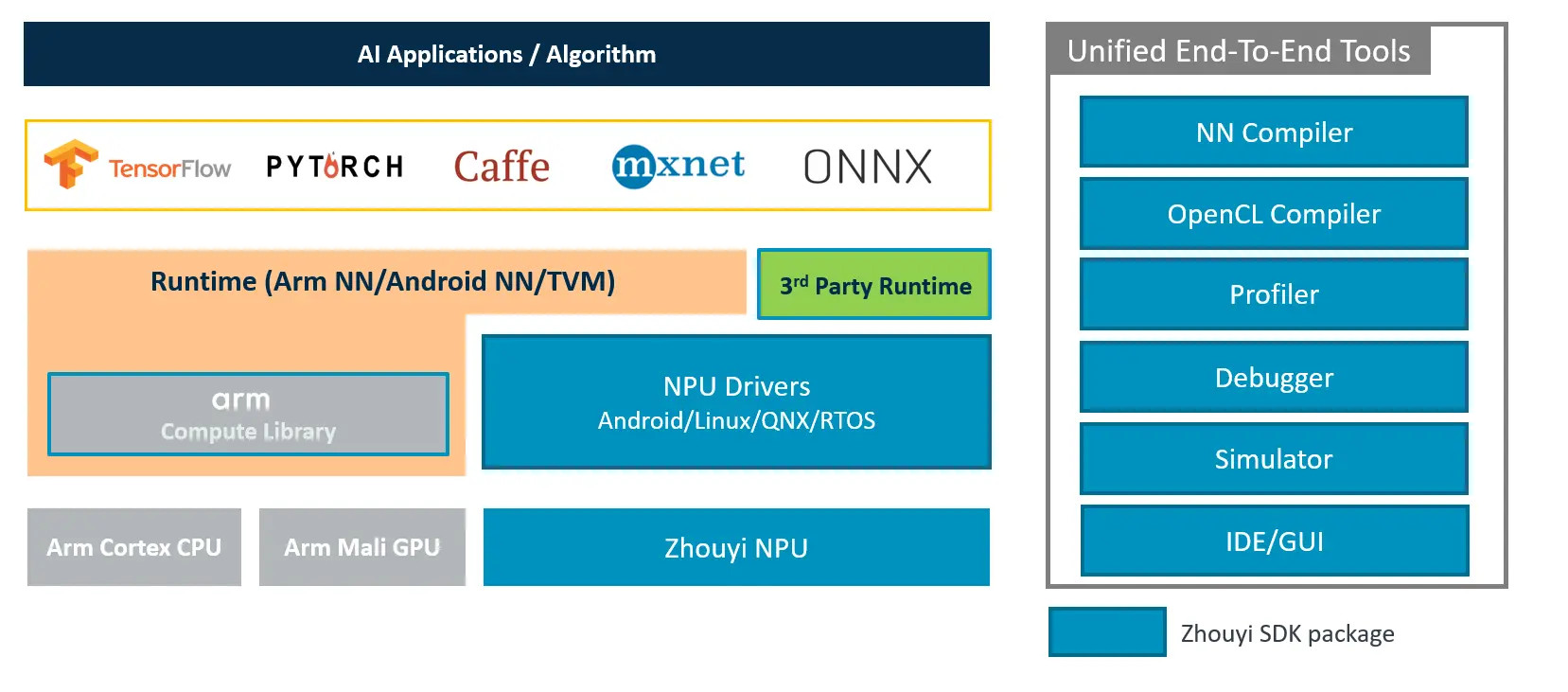Zhouyi AIPU SDK
The "Zhouyi" AIPU is an innovative AI processor specifically designed for deep learning by Arm China. It features a unique architecture, providing a complete hardware and software ecosystem with optimal PPA balance. Arm China also offers a range of tools for "Zhouyi" AIPU customers to assist with development, including simulators, compilers, and debuggers for data collection and analysis.
The "Zhouyi" AIPU supports mainstream AI frameworks such as TensorFlow and ONNX and will extend to support more frameworks in the future.
The "Zhouyi" Z2 AIPU is primarily designed for mid-to-high-end applications, including security, smart cockpits, ADAS, and edge servers.
Zhouyi AIPU SDK Installation Guide
The Zhouyi AIPU SDK must be installed on an X86 platform computer.
The Zhouyi SDK is a full-stack platform designed to provide users with rapid development and deployment capabilities. Its overall architecture is shown below:

Preparing the Installation Environment
The Zhouyi SDK requires a clean Python 3.8 environment. Before proceeding, ensure you have Python 3.8 set up.
-
(Optional) Install Anaconda
If Python 3.8 (the required version) is not installed, or multiple versions of Python are present, it is recommended to use Anaconda to create a new Python 3.8 environment.
-
Install Anaconda
Open a terminal window and run the following command to check if Anaconda is installed. If installed, skip these steps.
$ conda --version
conda 23.10.0If you see
conda: command not found, it indicates Anaconda is not installed. Please refer to the Anaconda website for installation instructions. -
Create a Conda Environment
conda create -n aipu python=3.8 -
Activate the
aipuConda Environmentconda activate aipu -
Exit the Environment
conda deactivate
-
Download the SDK Installation Package
Download the Zhouyi_Z2.tar.gz installation package from Radxa's download site and extract it:
tar -xvf Zhouyi_Z2.tar.gz
cd Zhouyi_Z2 && bash +x SETUP.SH
After installation, the complete SDK directory will include the following:
AI610-SDK-r1p3-AIoT: ARM Zhouyi Z2 toolkit.siengine: Example demos provided by siengine for ARM Zhouyi Z2 model compilation (nn-compiler-user-case-example) and board deployment (nn-runtime-user-case-example).
Configure the nn-compiler Environment
-
Install Dependencies
cd AI610-SDK-r1p3-AIoT/AI610-SDK-r1p3-00eac0/Out-Of-Box/out-of-box-nn-compiler
pip3 install -r lib_dependency.txttipSince this SDK does not include simulation features, errors during the installation of
AIPUSimProfilercan be ignored. -
Start the
nn-compilerEnvironmentFor users of
venv, remove the--useroption in thepip3 installsection ofenv_setup.sh.source env_setup.sh
SDK Documentation References
- Open Source Code Repository: https://github.com/Arm-China
- GitHub SDK Documentation: https://github.com/zifeng-radxa/siriders1_Zhouyi_SDK_docs
- SDK Included Documentation Path:
AI610-SDK-r1p3-AIoT/AI610-SDK-r1p3-00eac0/AI610-DOC-1001-r1p3-eac0
Recommended Reading Order:
- Zhouyi Compass Software Technical Overview
- Zhouyi Compass Getting Started Guide
- Zhouyi Compass Driver Runtime User Guide
- Zhouyi Compass NN Compiler User Guide
- Zhouyi Compass C Programming Guide
- Zhouyi Compass Debugger User Guide
- Zhouyi Compass IR Definition Application Note
- Zhouyi Compass Operators Specification Application Note
- Zhouyi CompassStudio User Guide (Chinese)